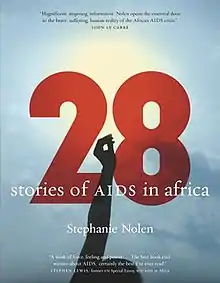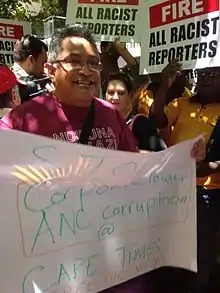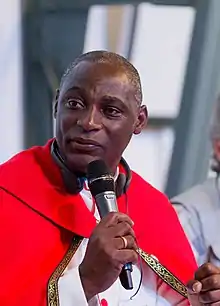28 Stories of AIDS in Africa
28 Stories of AIDS in Africa is a 2007 non-fiction book by Canadian journalist and author Stephanie Nolen.[1] It tells 28 stories of people who have worked tackling HIV/AIDS in healthcare, as advocates, and people who have been diagnosed as HIV positive and their family members.
 | |
| Author | Stephanie Nolen |
|---|---|
| Country | Canada |
| Subject | HIV/AIDS in Africa |
| Published | 1 May 2007 |
| Publisher | Walker & Company, Alfred A. Knopf Canada |
| Pages | 384 |
| Awards | 2007 PEN “Courage” Award winner |
| ISBN | 978-0802715982 |
The book has been met with widespread critical acclaim from academics, humanitarians, and book reviewers.
It was a national best selling book in Canada.[2]
Background
In 2003, Nolen, an award-winning[3] Canadian journalist, persuaded her superiors at The Globe and Mail to let her investigate and report on the AIDS pandemic in Africa.[4] She relocated to Johannesburg where she spent four years researching every aspect of the pandemic.[4]
Book summary

The book profiles 28 Africans who have HIV/AIDS, who have worked in healthcare or advocacy, or have otherwise been affected by the pandemic in sub-Saharan Africa, noting that 70% of global HIV cases are in sub-Saharan Africa.[5]
The book opens with background material about the work of Nolen, an explanation of HIV/AIDS in lay terms, and notes that 28 stories have been chosen because 28 million people had been infected with HIV/AIDS.[5][4]
Each of the 28 stories opens with a photograph of the person that is the subject of the chapter.[5]
- Chapter 1 Siphiwe Hlophe who cares for orphans in Swaziland.[6]
- Chapter 2 Tigist Haile Michael, an Ethiopian school girl orphaned by AIDS[7][8]
- Chapter 3 Mohammed Ali a Kenyan truck driver[9]
- Chapter 4 Prisca Mhlolo from Zimbabwe who was assaulted by her own family when she told them her positive HIV status[10]
- Chapter 5 Regine Mamba, a grandmother[11][12]
- Chapter 6 Lydia Mungherera, a Ugandan doctor[8]
 Gideon Byamugisha, in 2012
Gideon Byamugisha, in 2012 - Cahpter 7 Noé Sebisaba, a blood donor who was surprised to find himself with an HIV diagnosis[13]
- Chapter 8 Christine Amisi a Médecins Sans Frontières nurse[4]
- Chapter 9 Manuel Cossa, a migrant gold miner from Mozambique who worked in South Africa[4]
- Chapter 10 Cynthia Leshomo of Botswana who worked to reduce stigma[4]
- Chapter 11 Mfanimpela Thlabatse a farmer in Swaziland who lost his wife and children to HIV/AIDS just months before the treatments became available to his community[14]
- Chapter 12 Andualem Ayalew an Ethiopian soldier who lost his job and who was denied the opportunity to study abroad because of his HIV status[15][16]
- Chapter 13 Alice Kadzanja, a nurse in Zomba[4]
- Chapter 14 Zackie Achmat the famous South African HIV activist[17]
- Chapter 15 Lefa Khoele from Lesotho who struggled with HIV until he was given medication at age 12[10]
- Chapter 16 Pontiano Kaleebu a Ugandan doctor working on an HIV/AIDS vaccine[10]
- Chapter 17 Winstone Zulu the AIDS activist[8]
- Chapter 18 Agnes Munyiva a Kenyan sex workers who avoided AIDS despite over 2,000 sexual encounters[18][19]
- Chapter 19 Mpho Segomela a South African child who died of AIDS[19]
- Chapter 20 Anne Mumbi, a sex worker who avoided AIDS despite the odds[20]
- Chapter 21 Gideon Byamugisha the Ugandan priest who speaks about the good things he has done, and his failings[21]
- Chapter 22 Ida Mukuka an AIDS counselor from Lusaka[22]
- Chapter 23 Anita Manhiça a Mozambique housewife who was infected by her husband, but who was accused of infecting him [23]
- Chapter 24 Morolake Odetoyinbo who is struggling to live with the virus in Nigeria[24]
- Chapter 25 Moleen Mudimu who stopped being able to afford the medicine that help keep her alive once the Zimbabwean economy collapsed[8]
- Chapter 26 Ibrahim Umoru a Nigerian activist[25]
- Chapter 27 Nelson Mandela whose son died of AIDS[4]
- Chapter 28 Thokozani Mthiyane a South African who manages his HIV thanks to USAID subsidized medications[26]
The book ends with a chapter about how readers can help.[27]
Critical reception
Stephen Lewis described the book as "the best book ever written about AIDS, certainly the best I've ever read".[28]
The Guardian praised the book for focusing on the stories of people in Africa, rather than USA, and also credited Nolen for linking the stories to culture, society and politics.[1]
The Canadian Broadcasting Corporation described the book as "timely, transformative, thoroughly accessible" and described how Nolen writes with "power, understanding and simplicity."[29]
Bono called the book a "formidable book of record."[30]
Laretta Benjamin, an AIDS researcher, described the book as one of the best she has read, complimented Nolan for putting a human face on the statistics.[5]
The New Times of Rwanda described the book as probably the best written account of the history of HIV/AIDS.[4]
James Orbinski said of the book "Read. Weep. Rage. And above all else - like those people described in this book - find the courage to do."[3]
Awards
Editions
The book has been published in seven languages in eleven countries,[32] including:
- Hardcover, Random House, 2007, ISBN 978-0-8027-1598-2.
- Hardcover, Knopf Canada, 2007, ISBN 978-0-676-97822-3.
Notes
- "Thirty books to help us understand the world in 2020". The Guardian. 2020-10-18. Retrieved 2022-01-18.
- "Stephanie Nolen". The Globe and Mail. Retrieved 2022-01-19.
- "Review: 28 Stories of Aids in Africa by Stephanie Nolen". The Guardian. 2007-06-16. Retrieved 2022-01-18.
- "BOOK REVIEW : 28: Stories of AIDS in Africa". The New Times | Rwanda. 2010-01-03. Retrieved 2022-01-18.
- Benjamin, Laretta (2009-04-24). "FEATURED: 28: STORIES OF AIDS IN AFRICA". The Englewood Review of Books. Archived from the original on 2022-01-18. Retrieved 2022-01-18.
- "Putting a human face on AIDS". Edmonton Journal. Retrieved 2022-01-19.
- Pozez, Gerri. "28 Stories of AIDS in Africa." Journal of International Affairs, vol. 62, no. 2, spring-summer 2009, p. 241. Gale Academic OneFile, Accessed 18 January 2022.
- McCarthy, Mary (2008-07-01). "28 Stories of AIDS in Africa by Stephanie Nolen". Raidió Teilifís Éireann.
- "28 Stories of AIDS in Africa – Global Human Rights Direct". globalhumanrightsdirect.arizona.edu. Retrieved 2022-01-19.
- "Profiles from the Front Lines of Africa's AIDS War". NPR. Retrieved 2022-01-18.
- Malani, Preeti N. (2008-08-06). "28: Stories of AIDS in Africa". JAMA. 300 (5): 591–592. doi:10.1001/jama.300.5.591. ISSN 0098-7484.
- "Twenty-eight stories represent the many faces of HIV-AIDS". Calgary Herald. Retrieved 2022-01-19.
- Greene, Melissa Fay (2007-05-12). "AIDS: up-close, personal, devastating". The Globe and Mail. Retrieved 2022-01-19.
- Max, D. T. (2007-06-03). "Don't look away". Los Angeles Times. Archived from the original on 2022-01-19. Retrieved 2022-01-19.
- "28 Stories of AIDS in Africa, by Stephanie Nolen - 1022 Words". Bartleby. Retrieved 2022-01-19.
- "Tales of Despair and of Triumph Stephanie Nolen Reports on the AIDS Epidemic in Africa". Montreal Gazette. Retrieved 2022-01-19.
- "The AIDS beat". The Journal. Retrieved 2022-01-19.
- Nolen, Stephanie (2007-05-27). "Staying alive: the women who are immune to Aids". The Guardian. Retrieved 2022-01-19.
- Comfort, Laura. "Will the" fight" ever end?: a critical reading of the metaphors and discourses that construct HIV/AIDS in an African context." (2009).
- "28 Geschichten über Aids". Amnesty International Schweiz (in German). Retrieved 2022-01-19.
- Rice, Andrew (2007-05-24). "An African Solution". The Nation. ISSN 0027-8378. Retrieved 2022-01-19.
- "Mariposa Grandmothers, on behalf of the Stephen Lewis Foundation will run this event on Apr. 19". Toronto.com. 2015-04-16. Retrieved 2022-01-19.
- "Reading Guide from 28 | Penguin Random House Canada". Penguin Random House Canada. Retrieved 2022-01-19.
- Umunna, Gregory Ejiogu (2011). HIV/AIDS: Political Will and Hope. Xlibris Corporation. ISBN 978-1462869343.
- Robinson, Vicki (July 2007). "Lessons of health and history". Mail & Guardian.
- Nolen, Stephanie (2008-12-12). "Out of Africa". The Globe and Mail. Retrieved 2022-01-19.
- Lloyd, Robin (2007-08-07). "Book Review: Searching for Hope in AIDS-Ravaged Africa". Toward Freedom. Archived from the original on 2020-08-07. Retrieved 2022-01-19.
- Stephen Lewis Foundation We're Reading (Archived from the original on April 15, 2008)
- "Books: 28: Stories of AIDS in Africa". CBC Books. 15 Feb 2017.
- "28". Bloomsbury. Retrieved 2022-01-18.
- "Globe reporter's AIDS coverage earns PEN Courage Prize". CBC. 26 Oct 2007.
- "Stephanie Nolen". University of Calgary. Retrieved 2022-01-19.